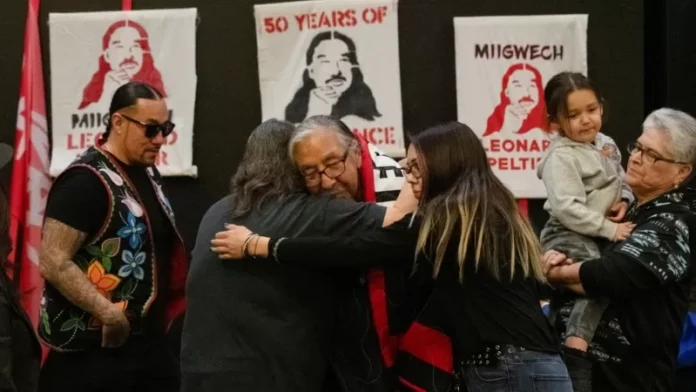BELCOURT, NORTH DAKOTA — Native American activist Leonard Peltier was welcomed home to North Dakota on Wednesday with open arms and a sense of gratitude after being released from a Florida prison where he had been serving a life sentence for the 1975 killings of two FBI agents.
Peltier, 80, was emotional as he addressed the crowd of about 500 people who had gathered in Belcourt, a small town just south of the Canadian border on the Turtle Mountain Band of Chippewa Indians’ reservation. The event was filled with food, a drum circle, and dancers, all in celebration of Peltier’s release.
“I’m so proud of the support and showing that you have given me,” Peltier said. “I have a hard time keeping myself from crying. A strong warrior cannot be seen crying in front of his people.”
Former President Joe Biden commuted Peltier’s life sentence to home confinement before leaving office, leading to his release on Tuesday from the Coleman penitentiary. Peltier was convicted of two counts of first-degree murder and given two consecutive life sentences for a 1975 confrontation on the Pine Ridge Indian Reservation in South Dakota.
During the confrontation, FBI agents Jack Coler and Ronald Williams were killed. While Peltier admitted to firing shots, he maintained that he was not the one responsible for the agents’ deaths. Many Native Americans believe that Peltier was a political prisoner who was wrongly convicted because of his activism as a member of the American Indian Movement.
For years, there were arguments against freeing Peltier from law enforcement officials. Even as Biden considered his options, former FBI Director Christopher Wray sent a letter to the president, calling Peltier “a remorseless killer” who should remain in prison.
However, numerous individuals and groups supported Peltier’s release, citing his age, the time he had already spent in prison, and his leadership role among Native Americans. In a statement about the commutation, Biden acknowledged this support and the importance of Peltier’s case to many.
For nearly five decades, Peltier has maintained his innocence and on Wednesday, he reiterated this, saying, “I spent 49 years straight in prison for something I didn’t do.” Despite his time behind bars, Peltier has continued to advocate for Native American rights and expressed his gratitude to tribes across the nation for their unwavering support.
“From the moment I was arrested, Indian people came to my rescue from all over the country,” Peltier said.
At the event, tribal leaders presented Peltier with an eagle feather staff that had been carried to Washington and other places as a symbol of the campaign for his release. He was also draped with a traditional star quilt, a symbol of honor and respect in Native American culture.
Nick Tilsen, an Oglala Lakota and founder of the NDN Collective, an Indigenous-led advocacy group, paid tribute to Peltier and his generation of American Indian Movement leaders for their bravery in standing up against the powerful US government.
“They instilled pride and a fighting spirit back into our people,” Tilsen said. “All around the world, Leonard Peltier’s name will be remembered as a warrior who outlasted one of the strongest governments in the world and emerged victorious.”
Turtle Mountain Band of Chippewa Tribal Chair Jamie Azure also spoke at the event, expressing the significance of Peltier’s return to his homeland and the impact he has had on the tribe and other Native Americans.
“The turnout here today is a testament to what he means to our tribe and to Native Americans as a whole,” Azure said. “To see Mr. Peltier come back to his homeland and just be home means a lot to a lot of people on many different levels.”
As tribal member Denise Lajimodiere put it, “It’s a big day. A day of celebration.” The release of Leonard Peltier has brought a sense of hope and joy to the Native American community, and his homecoming is a reminder of the resilience and strength of Indigenous peoples in the face of adversity.
Peltier’s release serves as a reminder of the ongoing struggles and injustices faced by Native Americans, but it also brings a sense of hope for a brighter future. As Peltier returns to his homeland, he carries with him the support and love of his people, and his legacy

